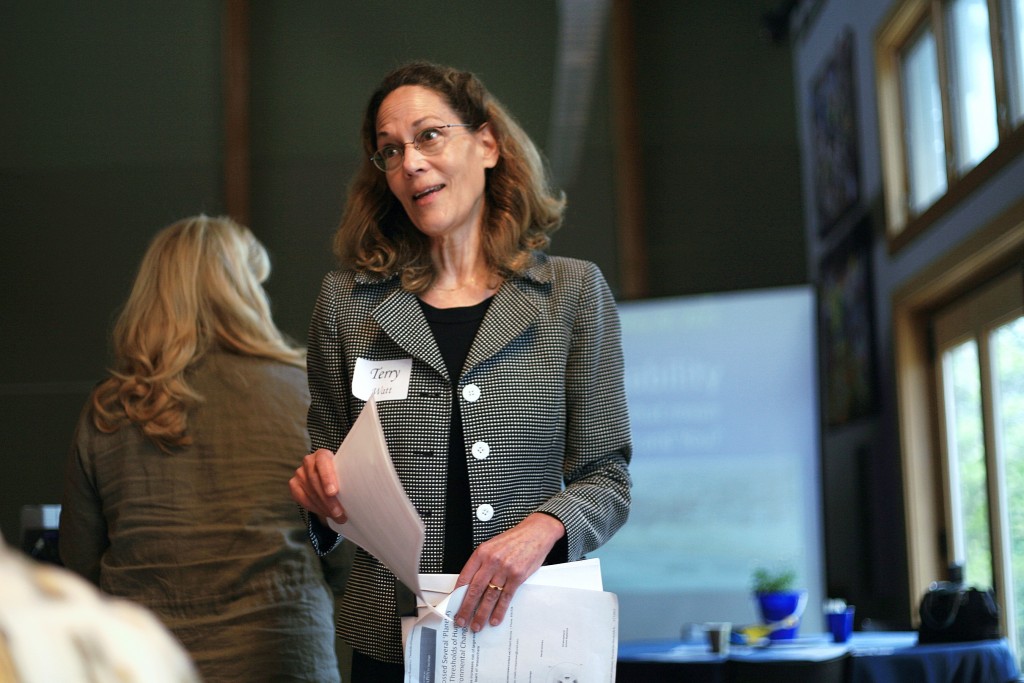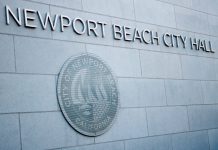
— Photo by Sara Hall
The future of Newport Beach and improving its sustainability were the main topics at a meeting last weekend.
The 41st Annual Meeting of Still Protecting Our Newport (formerly known as Stop Polluting Our Newport), held at the Environmental Nature Center on Saturday.
Guest speaker for the event was Terry Watt, a planning consultant based in San Francisco. Watt considered the topic locally with her speech “Sustainability: What does that mean for Newport and you?”
“It’s a no-brainer to go all in and be sustainable as a person, as a household, as a community, as a nation, and as a planet,” Watt said. “It’s all about efficiency, reducing waste, making better choices and having better choices available.”
There is a sustainability policy in the 2006 General Plan for Newport Beach, Watt pointed out, but it doesn’t embrace the concept as well as some other cities.
“There’s work to be done,” she said.
She referenced part 2.2 of the Land Use Element of the General Plan that explains the “Sustainable and Complete Community” policy to “emphasize the development of uses that enable Newport Beach to continue as a self-sustaining community and minimize the need for residents to travel outside of the community for retail, goods and services, and employment.”
It focuses on residents working, playing and buying goods and services all in Newport Beach.
“That’s not a bad policy,” Watt said. “It’s a little egocentric, but it’s a not bad policy.”
The best practices include clear and sensible targets and measures for success and benchmarking with a tracking system. Policy and action need to be consistent with the community’s sustainability vision, she added.
She likes to focus on three things: Mission, vision and accountability.
There are some real “measuring sticks” that can be used to determine the best practices, she explained.
“But you need to choose the ones that fit Newport,” Watt noted.
Tailoring the practices to Newport Beach is essential, she said.
“If you can’t measure it, you can’t manage it,” Watt said.
The leading edge approaches to measuring sustainability include the livability index, ecological footprint, and carbon footprint.
The Livability Index for Newport Beach is pretty low, Watt explained. The city scored 52 out of 100 (the higher the better) on the AARP calculator.
“The Livability Index scores neighborhoods and communities across the U.S. for the services and amenities that impact your life the most,” the website explains.
The online tool scores the selected in city in seven categories: Housing, neighborhood access, transportation, environment, health, engagement, and opportunity.
The main challenge Newport Beach has is housing affordability, Watt said.
Ecological footprint measures how fast people consume resources and generate waste compared to how fast nature can absorb the waste people produce and generate new resources.
Lowering personal waste doesn’t need to mean a lower quality of life, Watt noted.
Carbon footprint measures the amount of greenhouse gasses caused by an individual, household, entity or event.
The carbon footprint of a typical U.S. household is 48 tons per year, and a typical U.S. resident uses 13 tons, Watt explained. Her footprint is about eight or nine tons per year, she said. Watt also has friends who only use about two or three tons of carbon per year, while still maintaining their high quality of life, she noted.
Things like car or ride sharing, efficient transportation, using energy efficient appliances, waste reduction and recycling, are just a few ways to help, she explained. These actions can be written into city plans and policies without becoming too complicated, she added.
The first step is getting educated on the issue and starting a dialog. Community engagement is very important, Watt said. Residents, city leaders, politicians, scientists, business owners should all be involved. Everybody needs to work together, Watt added.
“You want everybody in this conversation,” she said.
Work needs to be done, she said, not only on an individual level, but for the community and the entire planet as well.
“The planet is in trouble,” she said.
There are planetary boundaries for sustainability, Watt explained.
Scientists have named nine: Climate change, change in biosphere integrity (biodiversity loss and species extinction), stratospheric ozone depletion, ocean acidification, biogeochemical flows (phosphorus and nitrogen cycles), land-system change, freshwater use, atmospheric aerosol loading, and introduction of novel entities (e.g. organic pollutants).
Scientists have agreed that four of these boundaries have already been exceeded, Watt noted.
“We’ve probably, possibly, changed nature as we know it… nature as we’ve experienced it in our lifetimes,” she said. “Changed it forever.”
The unanswered question she posed: “Have we changed the systems that support life on the planet forever or can we still reverse it?”
For more information, visit spon-newportbeach.org and livabilityindex.aarp.org.




